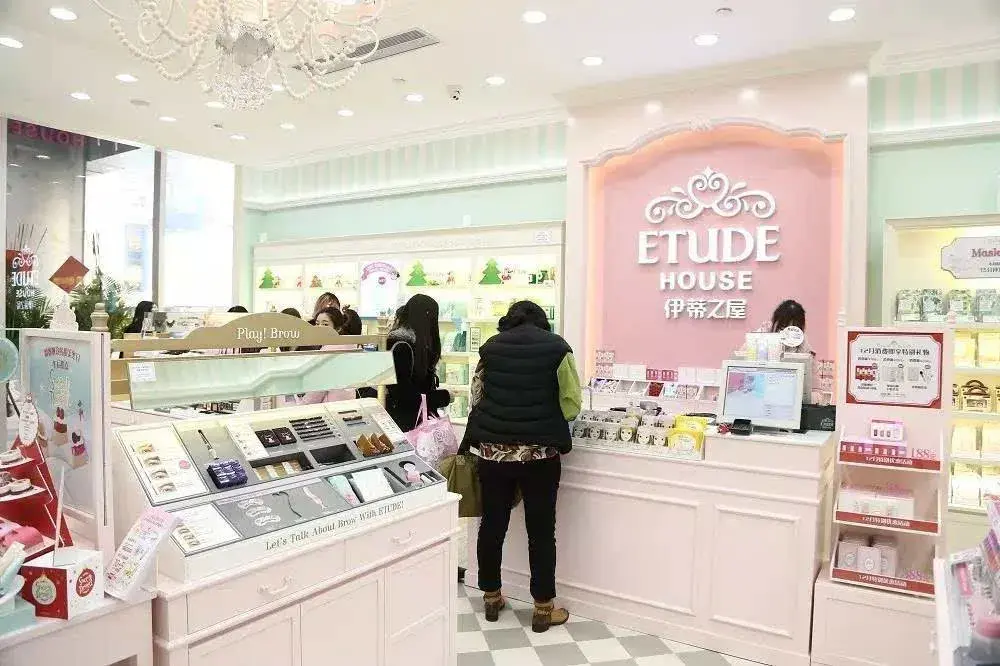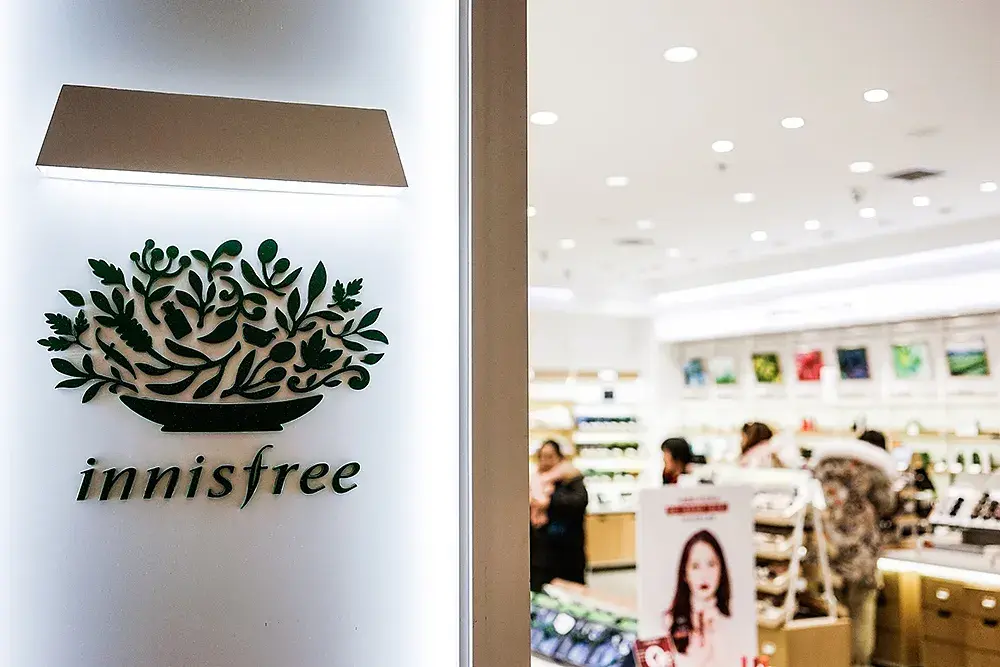Trillion mass beauty market, the rise of domestic products, Korean makeup has quietly retreated.
Text | AI Finance and Economics Society Jiang Jiao
Editor | Guo Luqing
Korean makeup ebbed, as if overnight.
Entering B1 floor of Beijing Joy City, the first thing you see is the China Beauty Collection Store on the right side of the shopping mall, where customers are choosing eye shadow and trying on lipstick. On the other hand, there is only a shopping guide who keeps drinking in the Korean beauty Yueshi Fengyun store, which is in stark contrast.
Since when did Korean beauty, which once had a halo on its head, become unpopular?
Everything is traceable. On March 8, ETUDE HOUSE closed all offline stores in China; INNISFREE, owned by another Korean cosmetics giant, Amore Pacific Construction Group, plans to close at least 90 stores in the mainland in 2020 due to huge losses; Earlier, THE FACE SHOP, a brand owned by LG Life Health, also withdrew from China.
A few years ago, with the popularity of popular Korean dramas such as Missing You, Descendants of the Sun and You from the Stars, Korean beauty cosmetics once occupied the makeup table of domestic girls. Now, in the trillion-dollar beauty market in China, Korean makeup has quietly retreated.
Korean makeup "failed" China
As a Korean makeup brand that was once popular among girls, it is embarrassing for Yidi House to shut down mainland stores. At present, although Edie House official website still displays information of 35 stores, butAI finance and economics societyThe reporter was informed that it has completed the offline store withdrawal in China.
This Korean makeup brand, which entered the China market with a sweet and fashionable image, was originally called Aili Cabin. At its peak, it opened 85 brand direct stores in 25 cities in the mainland, such as Beijing, Shanghai and Chengdu. In 2020, affected by the epidemic, the operating income of Yiti House fell by 38% to 111.3 billion won (about 640 million yuan), and recorded a large loss, making it the most bleak brand of its group, Amore Pacific.
In fact, the Yiti House, which was withdrawn from the store, is just a microcosm of the ebb tide of Korean beauty. Another once popular Korean brand, Fei Shi Xiao Shop, withdrew from the China market as early as 2018. Yue Shi Feng Yin, who belongs to Amore Pacific Construction Group and belongs to Yidi House, is also closing loss-making stores.

Photo/Yidi House offline store
According to relevant statistics, from 2019 to 2020, Yueshi Fengyun closed nearly 130 loss-making stores in mainland China. In addition, many Korean cosmetics stores such as NATURE REPUBLIC and Skin Food have been cutting offline stores in recent years.
Behind the frequent store closures, it reflects the decline of Korean cosmetics brands. According to the data of Korea Cosmetics Industry Research Institute, during the five years from 2013 to 2017, the growth rate of Korean cosmetics exports to China was 66%, which dropped to 20% in 2018 and only 14% remained in 2019. The arrival of the epidemic has accelerated the decline of Korean cosmetics in China.
According to CCTV’s financial report, due to the epidemic situation, Korean cosmetics are caught in the dilemma of export sales. Many small and medium-sized enterprises in Korea stopped working and suffered serious losses. In addition, the performance of Korean makeup giant Amore Pacific Construction Group has fallen sharply. The group’s revenue in fiscal year 2020 dropped by 21.5% and its profit by 69.8%.
Korean makeup has declined, and a person who has been engaged in Korean makeup purchasing business for 7 years is deeply touched. In the first two years, this person specializes in low-end Korean makeup brands such as Yue Shi Feng Yin and Si Qin Skin. These brands entered the China market with the Korean Wave, and were loved by many girls with their high cost performance, which also brought them a lot of income. Now, due to the sharp drop in orders, he has turned to purchasing high-end skin care products in Europe and America.
Why can’t Korean makeup, which supports China girls’ face value, work?
In today’s beauty market in China, apart from some steady European, American and Japanese brands and the booming domestic beauty products, Korean beauty products are becoming less and less. Why can’t Korean makeup, which once propped up the "face" of China girls, work?
For Korean makeup, 2016 is a turning point of fate. Prior to this, Korean beauty brands were all the rage because of the prevalence of Korean culture in China.
In 2013, a movie "You from the Stars" was all over China. Gianna Jun, the heroine, used two Korean lipstick brands in the play, which were sold out of stock nationwide immediately after the play was broadcast. Until now, some experienced beauty users can still clearly remember the hard-to-find situation of "Star Your Color" lipstick.
The prevalence of Korean Wave directly promotes the promotion of Korean makeup in China. In 2014, Korean cosmetics exports to China increased by 89% year-on-year, reaching US$ 600 million, accounting for 31% of its total exports, ranking first in the world. Since then, China has become the largest importer of Korean cosmetics. Then the share of Korean cosmetics in the domestic market gradually increased.
However, since then, with the cooling of the Korean Wave, Korean makeup has gradually declined in the China market. At the same time, China local beauty brands began to rise, Japanese beauty brands returned to consumers’ sight, and the market share of European and American brands in China also increased significantly. Strong competitors and the rise of the e-commerce industry have accelerated the decline of Korean makeup.
Korean makeup was originally known for its fast online speed, rich SKU and affordable price. It is reported that in 2016, the research and development cycle of affordable Korean cosmetics products can be shortened to 4-6 months, which is ahead of the industry level of the general one-year research and development cycle. However, this advantage was soon surpassed by domestic beauty products. For example, the perfect diary of domestic beauty brands can maintain the new frequency of 5-6 items per month in order to get more timely and direct market feedback.
With the rise of more and more domestic beauty cosmetics, the market competition is becoming more and more fierce, and the operating pressure of Korean beauty cosmetics is also increasing. In order to compete for market share, some Korean cosmetics distribute goods in a short and fast way, ignoring the sustainable development of the brand, and the product quality and cosmetic effect have been repeatedly criticized.
In 2017, official website, the General Administration of Quality Supervision, Inspection and Quarantine, announced 403 batches of food and cosmetics that were not allowed to enter. Among them, Lan Zhi, a beauty brand owned by Amore, was found to be susceptible to infection with Staphylococcus aureus. In 2018, the Korea Food and Drug Administration detected that there were 13 kinds of heavy metal antimony products in Amore’s 8 cosmetics brands.
In the little red book, many products of Yidi House were vomited by users. A girl who bought this brand of lipstick was even more bitter, complaining that the makeup was thick, difficult to apply evenly and smelled bad. Some insiders believe that the backwardness of Korean cosmetics lies not only in the product itself, but also in its failure to adapt to the changes in the China market.
It is difficult to form a trend again.
In fact, Korean beauty brands are not unaware of the crisis and have tried their best to save themselves.
However, the market structure of cosmetics in China has changed greatly, leaving few opportunities for Korean cosmetics.

Since 2019, Korean beauty giant LG Life Health has increased its digital marketing investment in China market. The group pays special attention to cultivating high-end brands such as post-Whoo, Sumi 37 and Ouhui, and cooperates with Viya, the head anchor, and invites Jiang Shuying, a popular actress, to be the image spokesperson of post-Whoo to boost the performance of mainland China.
Last year’s Double Eleven, after Whoo, the brand doubled its investment in live marketing. According to the data of ECdataway Dataway, during the pre-sale period of Double Eleven, after Whoo, the brand signed more than 130 anchors to bring goods, and the products appeared in more than 300 live broadcasts. During the pre-sale period, more than 80% of the pre-sale turnover after Whoo is guided by the live broadcast room.
In addition to high-end brands accelerating the layout of e-commerce channels, low-and medium-level brands have also begun to change their thinking and enter offline beauty collection stores. Previously, Yiti House once said that the closure of the store does not mean giving up the offline market. Later, in the China market, the colorist’s collection store will be the main offline position.
However, in contrast, domestic beauty products know the domestic market better, can grasp the changes in consumption trends more quickly, and occupy online channels earlier.
Domestic beauty cosmetics, represented by Perfect Diary, Flower Xizi and Orange Blossom, occupy consumers’ minds with faster new frequency and higher cost performance. Research data show that in 2020, the domestic cosmetic consumption market will account for 56%. 42% of consumers said that they would prefer to choose domestic cosmetics, and 90% of consumers said they would buy back domestic cosmetics in the future.
While Korean beauty products are still expanding their stores under the distress line, domestic beauty products have already used e-commerce platforms and social platforms to break the barriers of traditional marketing and achieve overtaking in corners. Now, whether you open Taobao, Little Red Book, Tik Tok E-commerce, bilibili and other platforms, you can see the domestic beauty products. In the first half of 2020, the content consumption of domestic brands on Xiaohongshu platform increased by 65.9% year-on-year, far exceeding European and American brands and Japanese, Korean and Thai brands.
"With the rise of national cultural self-confidence, a new generation of young consumers are more inclined to express their feelings and cultural attitudes through the’ national tide’, and are more willing to accept domestic beauty cosmetics planted on platforms such as Taobao Live, Tik Tok and Xiaohongshu, and are not easily influenced by Korean culture. Even if Korean high-end cosmetics still have some room for development in China, it is difficult to form a trend as before. " An industry veteran said.
This article was originally produced by AI Caijing Society, an account of Caijing Tianxia Weekly. Please don’t reprint it on any channel or platform without permission. Offenders will be prosecuted.